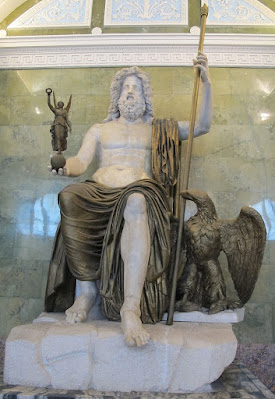“Declare, O Muse! in what ill-fated hour
Sprung the fierce strife, from what offended power
Latona’s son a dire contagion spread,
And heap’d the camp with mountains of the dead …”
– Homer’s “Iliad,” Book 1 (as translated by Alexander Pope) – which thus dedicates the “Iliad” to Greek goddesses known as “Muses”
So I recently listened to a three-hour audiobook called “Classical Religions and Myths of the Mediterranean Basin.” When I took a comparative world religions class some years ago, it was focused almost exclusively on modern religions. Therefore, it didn't really cover these older religions that are mostly gone today.
It was thus good to hear from these people about the early religions of Mesopotamia, Egypt, Asia Minor, Canaan, Greece, and Rome. It was also good to hear from them about how the literature and culture of these religions may have influenced the world in which the Hebrew and Christian scriptures took place. I thought that they may have carried their argument a bit too far at times, when they argued that the stories of this prior mythology may have influenced the stories of Judaism and Christianity, as found in the Hebrew and Christian scriptures. Nonetheless, I thought that they were much more solid on handling the beliefs of these other religions, as this was clearly written by people who had studied the subject in some detail.
Ra-Horakhty, a combined Ancient Egyptian deity of Horus and Ra
One inevitable problem with this audiobook may come from its trying to cover so many religions in just three hours. It's hard enough just keeping track of the names of all of these different gods, and how this one god in this one culture was influenced by this other god in this other culture. It's also hard to keep track of their particular beliefs about such things as the afterlife, and the existence of eternal rewards and punishments for one's earthly actions.
Statue of Zeus, the most important of the Ancient Greek gods
A major focus is on the literature, as it turns out, and on the different myths surrounding these different gods. Actually, my main problem with this audiobook may have been that it uses too much literary language for my tastes (some would say flowery language). To be fair, this “flowery language” may be exactly what is called for when translating certain scriptural works that were originally written in this way. But I get tired of this ornate and poetic sort of language after a while. I much prefer direct and clear communication as a general rule, and I get tired of language that tends to strike me as so much “literary fluff.”
Statue of Jupiter, the most important of the Ancient Roman gods (based on the Greek Zeus)
If this is evidence that I am uncultured, I admit my weakness openly; and would plead to my English-major friends that I am just not “cut out” for poetry. Despite this distaste for the poetic, though, this has still tended to strike me as a very enlightening audiobook, which helped me to understand some of the major players in the Judeo-Christian Bible. Judaism and Christianity interacted with many other religions in their early years, and this presentation helps one to understand some of these other religions in more detail.
“Tell me, O Muse, of that ingenious hero who travelled far and wide after he had sacked the famous town of Troy …”
– Homer’s “Odyssey,” Book 1 (as translated by Samuel Butler) – which thus dedicates the “Odyssey” as well to Greek goddesses called “Muses”
If you liked this post, you might also like:
Part of an audiobook series
Religions, Scriptures, and Spirituality
Classical Religions and Myths of the Mediterranean Basin
Judaism
Orthodox and Roman Catholic Christianity
Others to be covered later
Socrates
Stoics and Epicureans
Avicenna and Medieval Muslim Philosophy
Voltaire and Rousseau
Others to be covered later
See also the audiobook series
The World of Philosophy
Socrates
Stoics and Epicureans
Avicenna and Medieval Muslim Philosophy
Voltaire and Rousseau
Others to be covered later







No comments:
Post a Comment